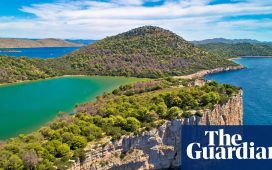In mid-February, after months of darkness, the sun returns to the Upernavik archipelago in the far north-west of Greenland. After spending the long polar night working in the archives of Upernavik Museum, I’m eager to leave the islands and experience life elsewhere in the Arctic.
By March, I’m flying south in clear spring skies. As the propeller plane makes its descent to Ilulissat, I see snow-covered hills and the glistening tongue of the Icefjord, a Unesco world heritage site. In my phone is the number of a friend’s cousin, a hunter who needs help building a website for his fledgling tour company. In exchange, he’ll give me a place to stay.
The taxi slaloms through the icy hills into the historic centre of Ilulissat with its colourful wooden homes, and stops among the social housing blocks down by the fish factory. The concrete stairwell is sprayed with graffiti, and plastic toys are scattered on the balconies. I know without checking the number that I’ve come to the right door: a pair of antlers hangs on the outside wall, and beneath is a pile of bones.
The door is ajar. I can hear the TV. I summon my courage and call inside, “Hi! Aluu?”

Malik emerges from the gloom, and ushers me down a corridor smelling of damp fur. I have never seen so many photographs: faded images of confirmations and weddings are propped on shelves, stuck on the fridge. I try to piece together Malik’s immediate family from these portraits, but there’s no need: soon his wife, Sarah, arrives home from her job as a hotel cleaner, and their two youngest boys thunder in from school. Malik’s uncle, who trained him to hunt when he was a boy, turns up with some seal to stew for supper.
Malik shows me my bedroom, and jokes it is my “Greenlandic office”. I would give a lot to be able to enjoy this high-rise view over the icebergs in Disko Bay every day. But the room belongs to his teenage son, Niels, who is away in Nunavut playing ice hockey at the Arctic Winter Games. The posters tacked to the walls are not of Greenlandic athletes but Manchester United players.
That evening Malik, as head of the household, gets the bath first and, as honoured guest, I’m offered the water second. This frugality is natural in a region of scant resources. I notice that Sarah saves the coffee in the filter paper for the next day. She tells me there’s a word for this: kinguneqartarpoq, to make a second brew from old coffee grounds. Malik is determined to follow his vocation as a hunter, sourcing food sustainably out on the sea ice as his ancestors have for centuries, despite the hardship it entails. But life is getting tougher as the nuanced knowledge of the environment his uncle instilled grows obsolete. Now, the ice is too unpredictable to read, and that makes it dangerous. One misstep while ice-fishing can mean a fatal fall into freezing water.

Over a midweek supper, Malik casually mentions a friend who drowned a few weeks ago. He speaks as if this was not unusual: it’s a shocking insight into the human cost of ecological disaster. I wonder if he’s indifferent to the issue, until a programme about the Amazon rainforest begins to play on the widescreen TV. Malik gestures at the screen: “People should stop doing these things. Cutting down trees in Brazil. Building dams. Flying. Everything. The ice is vanishing. Soon we won’t be able to live here any more.”
He turns to look at me. “Promise you’ll tell everyone what is happening here.” My appetite vanishes. How could I explain that most people already know the consequences of their actions, but carry on regardless? Malik’s serious words cause me a sleepless night, as I wonder how to pass on the message he’s given me.

Malik’s trust transforms me from a curious traveller to a witness. I am determined to repay his hospitality with more than just web copy and html. I’d lived among hunting families further north; I’d taught their children in the small island school and celebrated winter festivities with a community I felt increasingly at home in. Yet it was this encounter with an individual caught between two worlds, and the promise he elicited from me, that fuelled my desire to spend the next decade writing about contemporary Arctic life.
Climate crisis has turned Malik into an entrepreneur. Setting up a tour company is a way to reclaim the freedom that the passing of traditional ways of life takes from him. On my last day, when I’m weary of my laptop screen, he proposes a dogsled ride. It’s a breathtaking race across the frozen landscape on a rickety sled, the fading/vanishing ice formations he hopes to show tourists passing so fast they disappear in a blur before my eyes. We return late, as the evening round begins: hunters go out to feed their huskies, blood is scrubbed from the boats and the retreating glacier calves one more berg into the dark fjord.
• Fifty Words for Snow by Nancy Campbell is published by Elliott and Thompson, £12.99. To buy a copy online for £11.30 go to the Guardian Bookshop














